Contract Law in Construction Management: Analysis of London & Amsterdam Properties Ltd. v. Waterman Partnership Ltd
VerifiedAdded on 2023/06/13
|7
|1828
|234
AI Summary
This article analyzes the case of London & Amsterdam Properties Ltd. v. Waterman Partnership Ltd and its implications on contract law in construction management. It discusses the role of adjudicators, limits of appeals, and compliance with the law. The case shows that adjudicators are required to comply with the law while making their decisions. The rules of evidence and admissibility apply when evidence ought to be admitted. The adjudicators are required to balance the interest of both parties and not disadvantage the other. Appeals on the point of law should not overturn applying to facts unless the appeal falls on bounds of unreasonable judgment.
Contribute Materials
Your contribution can guide someone’s learning journey. Share your
documents today.
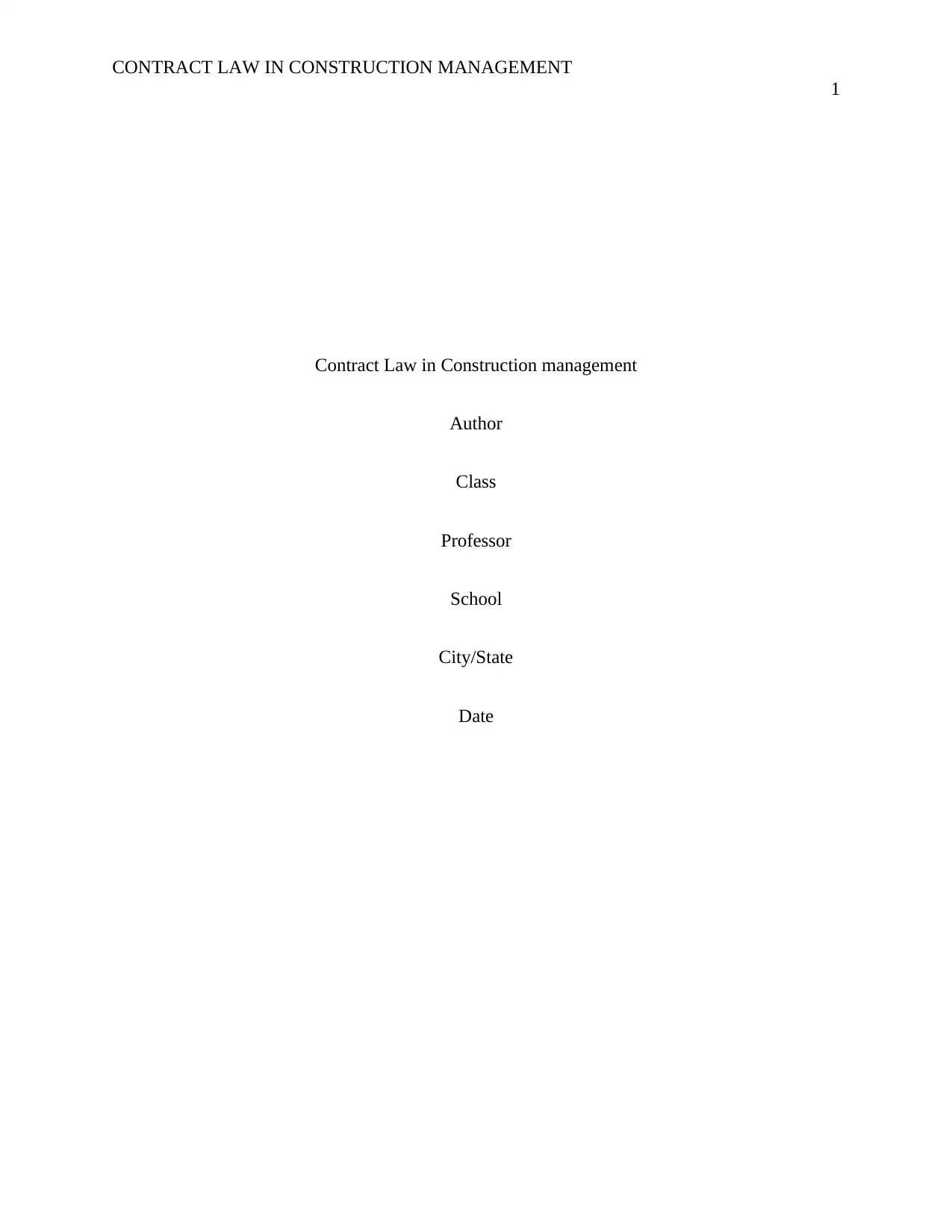
CONTRACT LAW IN CONSTRUCTION MANAGEMENT
1
Contract Law in Construction management
Author
Class
Professor
School
City/State
Date
1
Contract Law in Construction management
Author
Class
Professor
School
City/State
Date
Secure Best Marks with AI Grader
Need help grading? Try our AI Grader for instant feedback on your assignments.
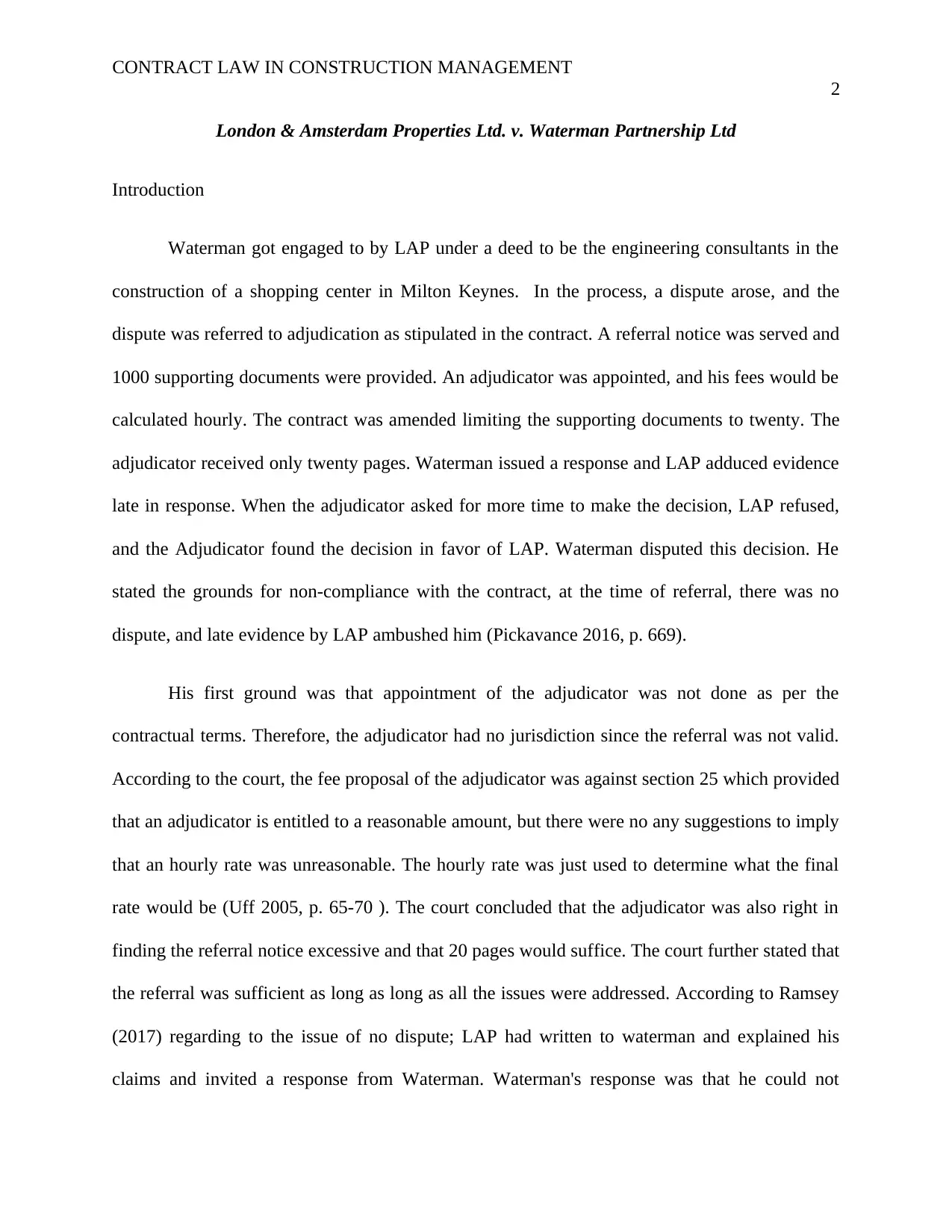
CONTRACT LAW IN CONSTRUCTION MANAGEMENT
2
London & Amsterdam Properties Ltd. v. Waterman Partnership Ltd
Introduction
Waterman got engaged to by LAP under a deed to be the engineering consultants in the
construction of a shopping center in Milton Keynes. In the process, a dispute arose, and the
dispute was referred to adjudication as stipulated in the contract. A referral notice was served and
1000 supporting documents were provided. An adjudicator was appointed, and his fees would be
calculated hourly. The contract was amended limiting the supporting documents to twenty. The
adjudicator received only twenty pages. Waterman issued a response and LAP adduced evidence
late in response. When the adjudicator asked for more time to make the decision, LAP refused,
and the Adjudicator found the decision in favor of LAP. Waterman disputed this decision. He
stated the grounds for non-compliance with the contract, at the time of referral, there was no
dispute, and late evidence by LAP ambushed him (Pickavance 2016, p. 669).
His first ground was that appointment of the adjudicator was not done as per the
contractual terms. Therefore, the adjudicator had no jurisdiction since the referral was not valid.
According to the court, the fee proposal of the adjudicator was against section 25 which provided
that an adjudicator is entitled to a reasonable amount, but there were no any suggestions to imply
that an hourly rate was unreasonable. The hourly rate was just used to determine what the final
rate would be (Uff 2005, p. 65-70 ). The court concluded that the adjudicator was also right in
finding the referral notice excessive and that 20 pages would suffice. The court further stated that
the referral was sufficient as long as long as all the issues were addressed. According to Ramsey
(2017) regarding to the issue of no dispute; LAP had written to waterman and explained his
claims and invited a response from Waterman. Waterman's response was that he could not
2
London & Amsterdam Properties Ltd. v. Waterman Partnership Ltd
Introduction
Waterman got engaged to by LAP under a deed to be the engineering consultants in the
construction of a shopping center in Milton Keynes. In the process, a dispute arose, and the
dispute was referred to adjudication as stipulated in the contract. A referral notice was served and
1000 supporting documents were provided. An adjudicator was appointed, and his fees would be
calculated hourly. The contract was amended limiting the supporting documents to twenty. The
adjudicator received only twenty pages. Waterman issued a response and LAP adduced evidence
late in response. When the adjudicator asked for more time to make the decision, LAP refused,
and the Adjudicator found the decision in favor of LAP. Waterman disputed this decision. He
stated the grounds for non-compliance with the contract, at the time of referral, there was no
dispute, and late evidence by LAP ambushed him (Pickavance 2016, p. 669).
His first ground was that appointment of the adjudicator was not done as per the
contractual terms. Therefore, the adjudicator had no jurisdiction since the referral was not valid.
According to the court, the fee proposal of the adjudicator was against section 25 which provided
that an adjudicator is entitled to a reasonable amount, but there were no any suggestions to imply
that an hourly rate was unreasonable. The hourly rate was just used to determine what the final
rate would be (Uff 2005, p. 65-70 ). The court concluded that the adjudicator was also right in
finding the referral notice excessive and that 20 pages would suffice. The court further stated that
the referral was sufficient as long as long as all the issues were addressed. According to Ramsey
(2017) regarding to the issue of no dispute; LAP had written to waterman and explained his
claims and invited a response from Waterman. Waterman's response was that he could not
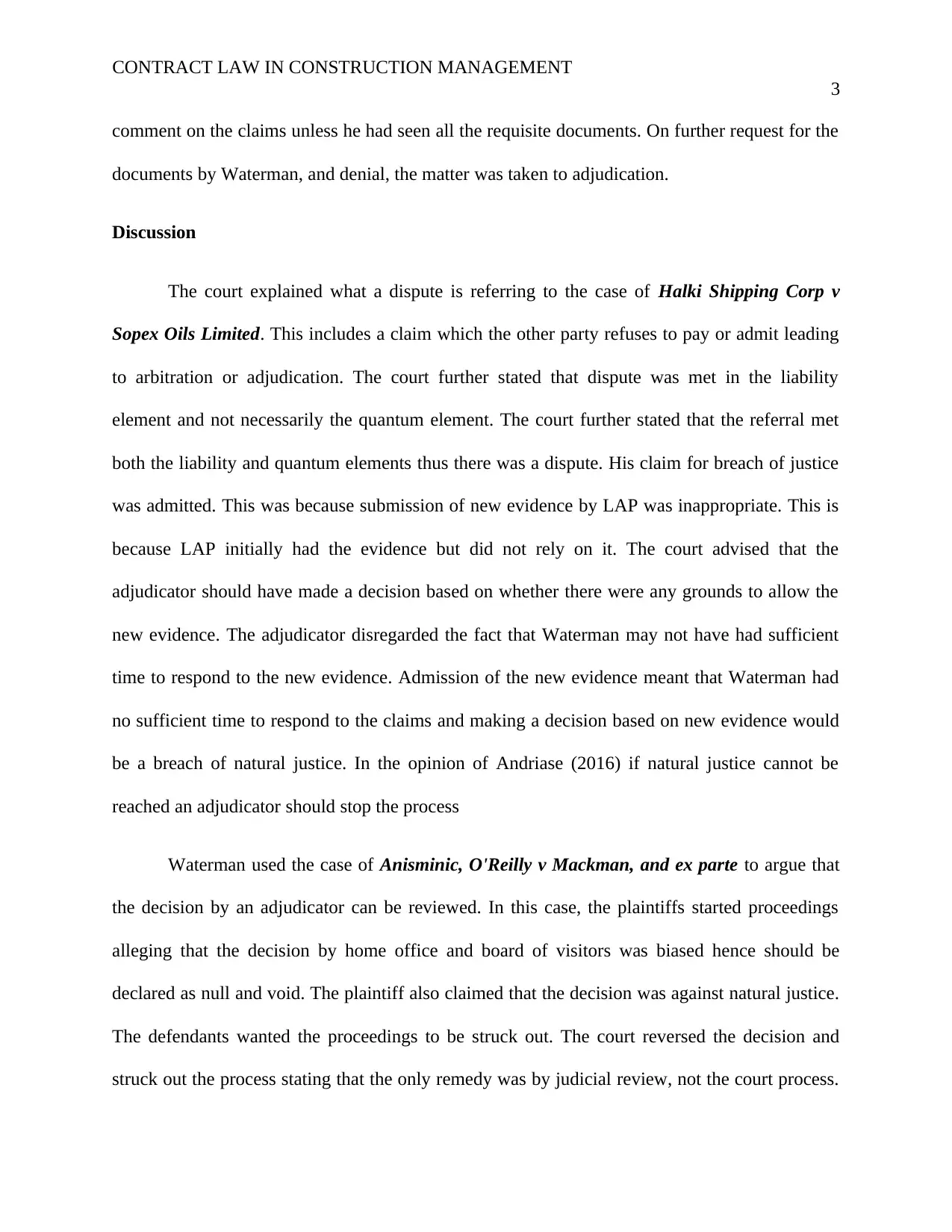
CONTRACT LAW IN CONSTRUCTION MANAGEMENT
3
comment on the claims unless he had seen all the requisite documents. On further request for the
documents by Waterman, and denial, the matter was taken to adjudication.
Discussion
The court explained what a dispute is referring to the case of Halki Shipping Corp v
Sopex Oils Limited. This includes a claim which the other party refuses to pay or admit leading
to arbitration or adjudication. The court further stated that dispute was met in the liability
element and not necessarily the quantum element. The court further stated that the referral met
both the liability and quantum elements thus there was a dispute. His claim for breach of justice
was admitted. This was because submission of new evidence by LAP was inappropriate. This is
because LAP initially had the evidence but did not rely on it. The court advised that the
adjudicator should have made a decision based on whether there were any grounds to allow the
new evidence. The adjudicator disregarded the fact that Waterman may not have had sufficient
time to respond to the new evidence. Admission of the new evidence meant that Waterman had
no sufficient time to respond to the claims and making a decision based on new evidence would
be a breach of natural justice. In the opinion of Andriase (2016) if natural justice cannot be
reached an adjudicator should stop the process
Waterman used the case of Anisminic, O'Reilly v Mackman, and ex parte to argue that
the decision by an adjudicator can be reviewed. In this case, the plaintiffs started proceedings
alleging that the decision by home office and board of visitors was biased hence should be
declared as null and void. The plaintiff also claimed that the decision was against natural justice.
The defendants wanted the proceedings to be struck out. The court reversed the decision and
struck out the process stating that the only remedy was by judicial review, not the court process.
3
comment on the claims unless he had seen all the requisite documents. On further request for the
documents by Waterman, and denial, the matter was taken to adjudication.
Discussion
The court explained what a dispute is referring to the case of Halki Shipping Corp v
Sopex Oils Limited. This includes a claim which the other party refuses to pay or admit leading
to arbitration or adjudication. The court further stated that dispute was met in the liability
element and not necessarily the quantum element. The court further stated that the referral met
both the liability and quantum elements thus there was a dispute. His claim for breach of justice
was admitted. This was because submission of new evidence by LAP was inappropriate. This is
because LAP initially had the evidence but did not rely on it. The court advised that the
adjudicator should have made a decision based on whether there were any grounds to allow the
new evidence. The adjudicator disregarded the fact that Waterman may not have had sufficient
time to respond to the new evidence. Admission of the new evidence meant that Waterman had
no sufficient time to respond to the claims and making a decision based on new evidence would
be a breach of natural justice. In the opinion of Andriase (2016) if natural justice cannot be
reached an adjudicator should stop the process
Waterman used the case of Anisminic, O'Reilly v Mackman, and ex parte to argue that
the decision by an adjudicator can be reviewed. In this case, the plaintiffs started proceedings
alleging that the decision by home office and board of visitors was biased hence should be
declared as null and void. The plaintiff also claimed that the decision was against natural justice.
The defendants wanted the proceedings to be struck out. The court reversed the decision and
struck out the process stating that the only remedy was by judicial review, not the court process.
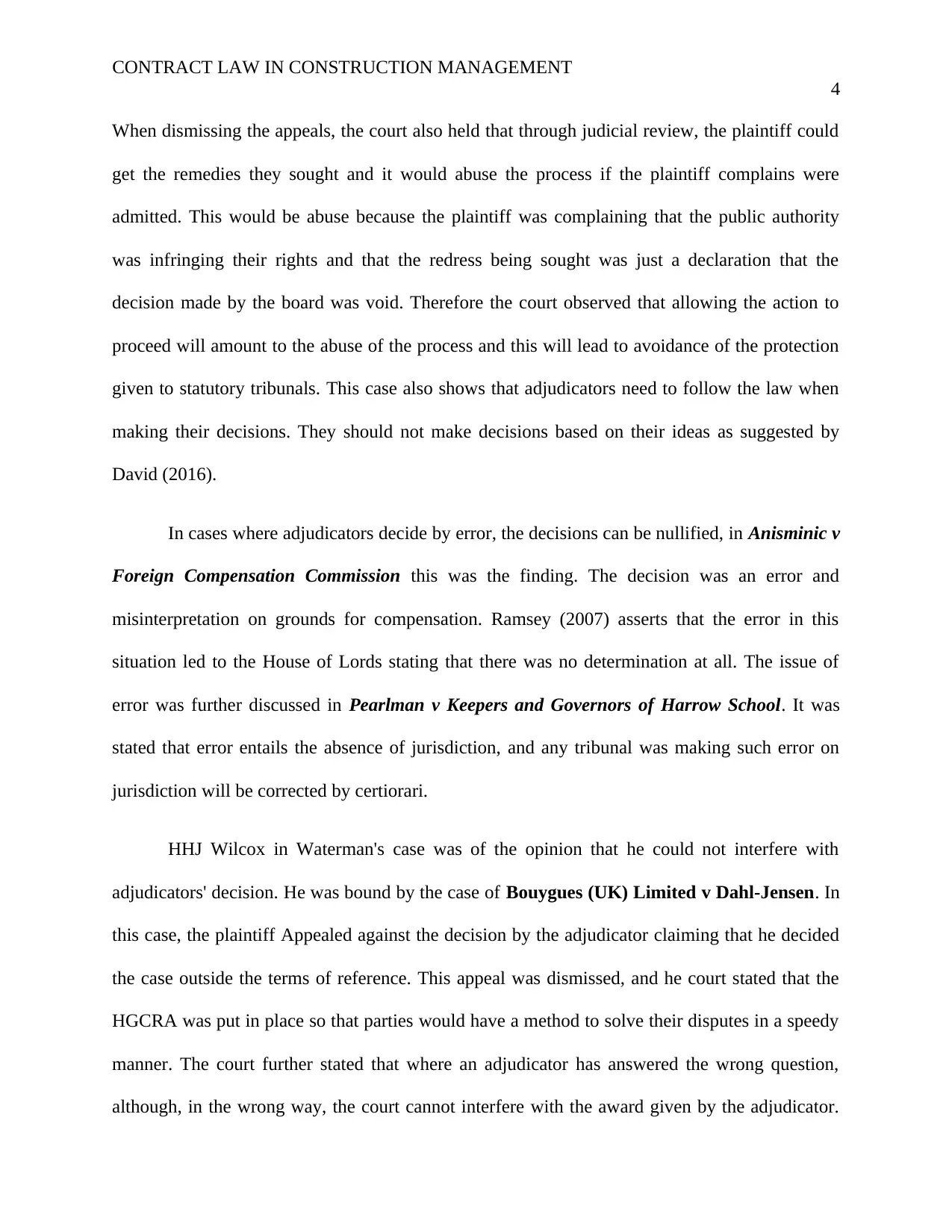
CONTRACT LAW IN CONSTRUCTION MANAGEMENT
4
When dismissing the appeals, the court also held that through judicial review, the plaintiff could
get the remedies they sought and it would abuse the process if the plaintiff complains were
admitted. This would be abuse because the plaintiff was complaining that the public authority
was infringing their rights and that the redress being sought was just a declaration that the
decision made by the board was void. Therefore the court observed that allowing the action to
proceed will amount to the abuse of the process and this will lead to avoidance of the protection
given to statutory tribunals. This case also shows that adjudicators need to follow the law when
making their decisions. They should not make decisions based on their ideas as suggested by
David (2016).
In cases where adjudicators decide by error, the decisions can be nullified, in Anisminic v
Foreign Compensation Commission this was the finding. The decision was an error and
misinterpretation on grounds for compensation. Ramsey (2007) asserts that the error in this
situation led to the House of Lords stating that there was no determination at all. The issue of
error was further discussed in Pearlman v Keepers and Governors of Harrow School. It was
stated that error entails the absence of jurisdiction, and any tribunal was making such error on
jurisdiction will be corrected by certiorari.
HHJ Wilcox in Waterman's case was of the opinion that he could not interfere with
adjudicators' decision. He was bound by the case of Bouygues (UK) Limited v Dahl-Jensen. In
this case, the plaintiff Appealed against the decision by the adjudicator claiming that he decided
the case outside the terms of reference. This appeal was dismissed, and he court stated that the
HGCRA was put in place so that parties would have a method to solve their disputes in a speedy
manner. The court further stated that where an adjudicator has answered the wrong question,
although, in the wrong way, the court cannot interfere with the award given by the adjudicator.
4
When dismissing the appeals, the court also held that through judicial review, the plaintiff could
get the remedies they sought and it would abuse the process if the plaintiff complains were
admitted. This would be abuse because the plaintiff was complaining that the public authority
was infringing their rights and that the redress being sought was just a declaration that the
decision made by the board was void. Therefore the court observed that allowing the action to
proceed will amount to the abuse of the process and this will lead to avoidance of the protection
given to statutory tribunals. This case also shows that adjudicators need to follow the law when
making their decisions. They should not make decisions based on their ideas as suggested by
David (2016).
In cases where adjudicators decide by error, the decisions can be nullified, in Anisminic v
Foreign Compensation Commission this was the finding. The decision was an error and
misinterpretation on grounds for compensation. Ramsey (2007) asserts that the error in this
situation led to the House of Lords stating that there was no determination at all. The issue of
error was further discussed in Pearlman v Keepers and Governors of Harrow School. It was
stated that error entails the absence of jurisdiction, and any tribunal was making such error on
jurisdiction will be corrected by certiorari.
HHJ Wilcox in Waterman's case was of the opinion that he could not interfere with
adjudicators' decision. He was bound by the case of Bouygues (UK) Limited v Dahl-Jensen. In
this case, the plaintiff Appealed against the decision by the adjudicator claiming that he decided
the case outside the terms of reference. This appeal was dismissed, and he court stated that the
HGCRA was put in place so that parties would have a method to solve their disputes in a speedy
manner. The court further stated that where an adjudicator has answered the wrong question,
although, in the wrong way, the court cannot interfere with the award given by the adjudicator.
Secure Best Marks with AI Grader
Need help grading? Try our AI Grader for instant feedback on your assignments.
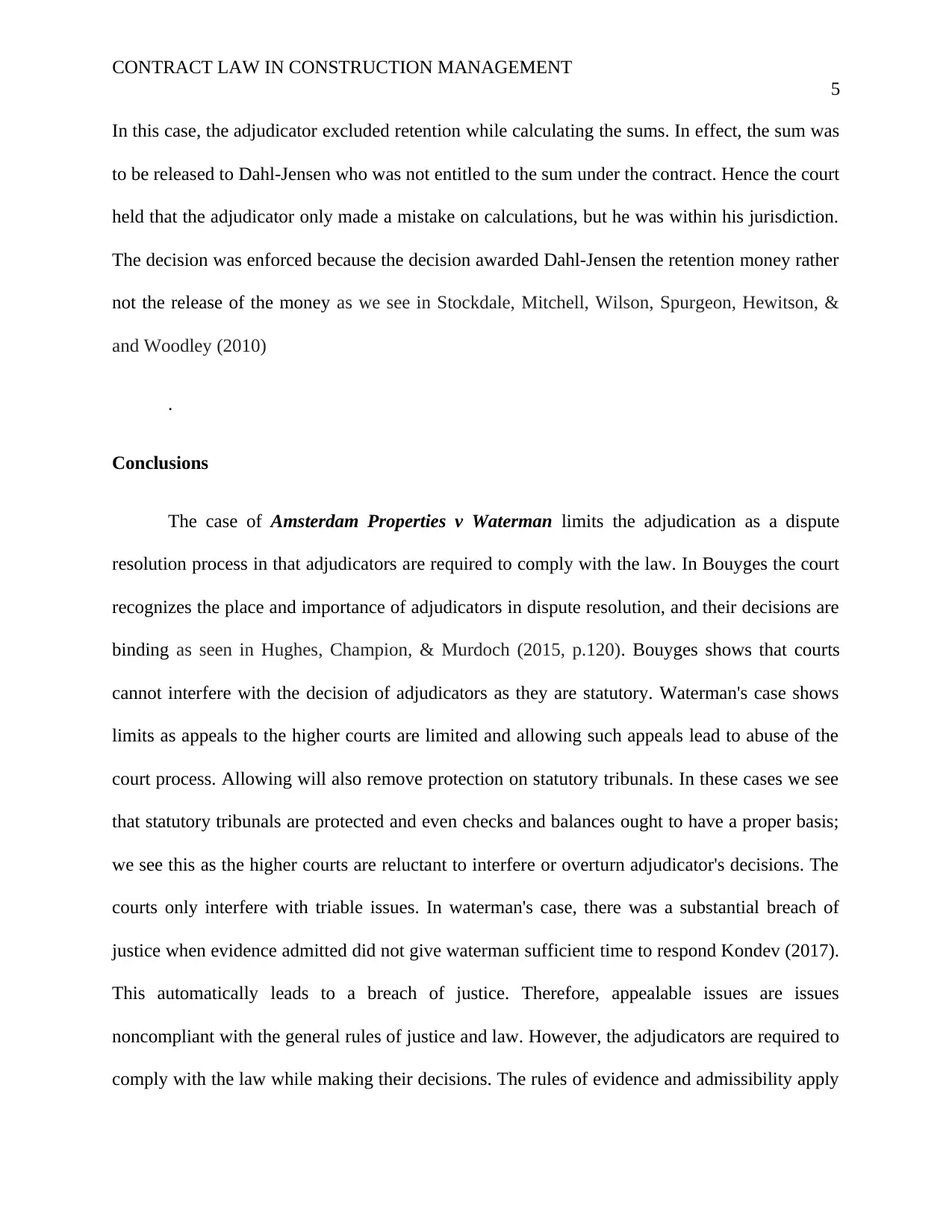
CONTRACT LAW IN CONSTRUCTION MANAGEMENT
5
In this case, the adjudicator excluded retention while calculating the sums. In effect, the sum was
to be released to Dahl-Jensen who was not entitled to the sum under the contract. Hence the court
held that the adjudicator only made a mistake on calculations, but he was within his jurisdiction.
The decision was enforced because the decision awarded Dahl-Jensen the retention money rather
not the release of the money as we see in Stockdale, Mitchell, Wilson, Spurgeon, Hewitson, &
and Woodley (2010)
.
Conclusions
The case of Amsterdam Properties v Waterman limits the adjudication as a dispute
resolution process in that adjudicators are required to comply with the law. In Bouyges the court
recognizes the place and importance of adjudicators in dispute resolution, and their decisions are
binding as seen in Hughes, Champion, & Murdoch (2015, p.120). Bouyges shows that courts
cannot interfere with the decision of adjudicators as they are statutory. Waterman's case shows
limits as appeals to the higher courts are limited and allowing such appeals lead to abuse of the
court process. Allowing will also remove protection on statutory tribunals. In these cases we see
that statutory tribunals are protected and even checks and balances ought to have a proper basis;
we see this as the higher courts are reluctant to interfere or overturn adjudicator's decisions. The
courts only interfere with triable issues. In waterman's case, there was a substantial breach of
justice when evidence admitted did not give waterman sufficient time to respond Kondev (2017).
This automatically leads to a breach of justice. Therefore, appealable issues are issues
noncompliant with the general rules of justice and law. However, the adjudicators are required to
comply with the law while making their decisions. The rules of evidence and admissibility apply
5
In this case, the adjudicator excluded retention while calculating the sums. In effect, the sum was
to be released to Dahl-Jensen who was not entitled to the sum under the contract. Hence the court
held that the adjudicator only made a mistake on calculations, but he was within his jurisdiction.
The decision was enforced because the decision awarded Dahl-Jensen the retention money rather
not the release of the money as we see in Stockdale, Mitchell, Wilson, Spurgeon, Hewitson, &
and Woodley (2010)
.
Conclusions
The case of Amsterdam Properties v Waterman limits the adjudication as a dispute
resolution process in that adjudicators are required to comply with the law. In Bouyges the court
recognizes the place and importance of adjudicators in dispute resolution, and their decisions are
binding as seen in Hughes, Champion, & Murdoch (2015, p.120). Bouyges shows that courts
cannot interfere with the decision of adjudicators as they are statutory. Waterman's case shows
limits as appeals to the higher courts are limited and allowing such appeals lead to abuse of the
court process. Allowing will also remove protection on statutory tribunals. In these cases we see
that statutory tribunals are protected and even checks and balances ought to have a proper basis;
we see this as the higher courts are reluctant to interfere or overturn adjudicator's decisions. The
courts only interfere with triable issues. In waterman's case, there was a substantial breach of
justice when evidence admitted did not give waterman sufficient time to respond Kondev (2017).
This automatically leads to a breach of justice. Therefore, appealable issues are issues
noncompliant with the general rules of justice and law. However, the adjudicators are required to
comply with the law while making their decisions. The rules of evidence and admissibility apply
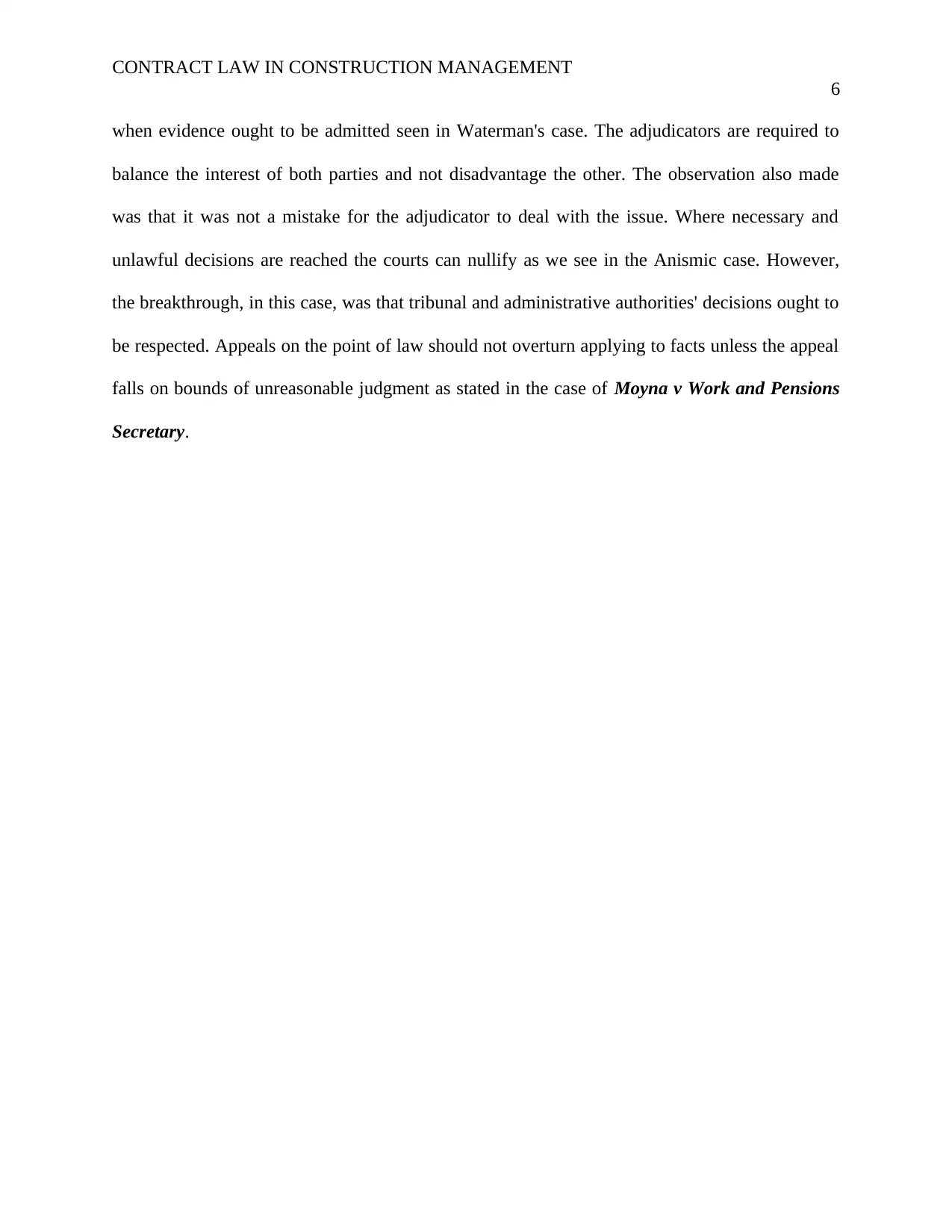
CONTRACT LAW IN CONSTRUCTION MANAGEMENT
6
when evidence ought to be admitted seen in Waterman's case. The adjudicators are required to
balance the interest of both parties and not disadvantage the other. The observation also made
was that it was not a mistake for the adjudicator to deal with the issue. Where necessary and
unlawful decisions are reached the courts can nullify as we see in the Anismic case. However,
the breakthrough, in this case, was that tribunal and administrative authorities' decisions ought to
be respected. Appeals on the point of law should not overturn applying to facts unless the appeal
falls on bounds of unreasonable judgment as stated in the case of Moyna v Work and Pensions
Secretary.
6
when evidence ought to be admitted seen in Waterman's case. The adjudicators are required to
balance the interest of both parties and not disadvantage the other. The observation also made
was that it was not a mistake for the adjudicator to deal with the issue. Where necessary and
unlawful decisions are reached the courts can nullify as we see in the Anismic case. However,
the breakthrough, in this case, was that tribunal and administrative authorities' decisions ought to
be respected. Appeals on the point of law should not overturn applying to facts unless the appeal
falls on bounds of unreasonable judgment as stated in the case of Moyna v Work and Pensions
Secretary.
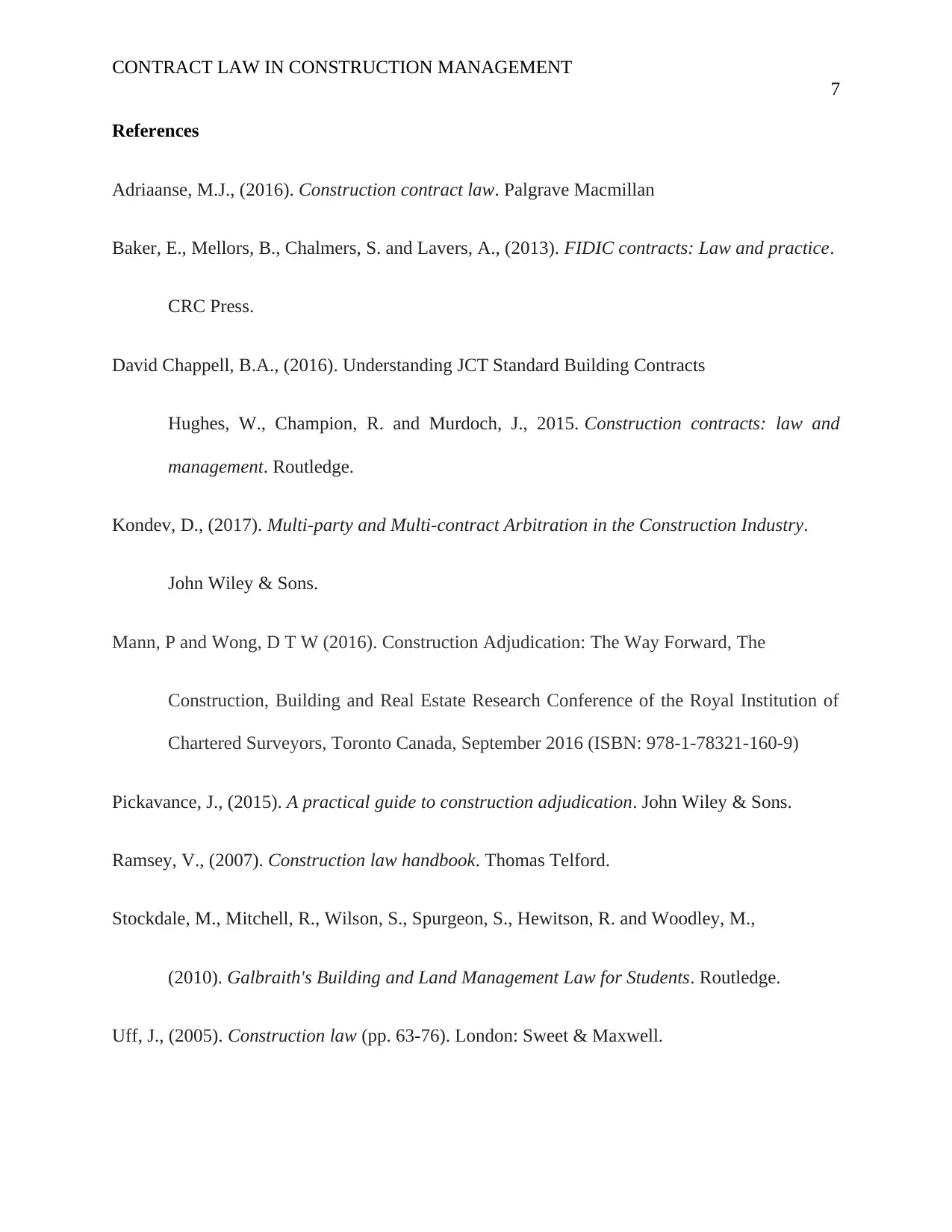
CONTRACT LAW IN CONSTRUCTION MANAGEMENT
7
References
Adriaanse, M.J., (2016). Construction contract law. Palgrave Macmillan
Baker, E., Mellors, B., Chalmers, S. and Lavers, A., (2013). FIDIC contracts: Law and practice.
CRC Press.
David Chappell, B.A., (2016). Understanding JCT Standard Building Contracts
Hughes, W., Champion, R. and Murdoch, J., 2015. Construction contracts: law and
management. Routledge.
Kondev, D., (2017). Multi-party and Multi-contract Arbitration in the Construction Industry.
John Wiley & Sons.
Mann, P and Wong, D T W (2016). Construction Adjudication: The Way Forward, The
Construction, Building and Real Estate Research Conference of the Royal Institution of
Chartered Surveyors, Toronto Canada, September 2016 (ISBN: 978-1-78321-160-9)
Pickavance, J., (2015). A practical guide to construction adjudication. John Wiley & Sons.
Ramsey, V., (2007). Construction law handbook. Thomas Telford.
Stockdale, M., Mitchell, R., Wilson, S., Spurgeon, S., Hewitson, R. and Woodley, M.,
(2010). Galbraith's Building and Land Management Law for Students. Routledge.
Uff, J., (2005). Construction law (pp. 63-76). London: Sweet & Maxwell.
7
References
Adriaanse, M.J., (2016). Construction contract law. Palgrave Macmillan
Baker, E., Mellors, B., Chalmers, S. and Lavers, A., (2013). FIDIC contracts: Law and practice.
CRC Press.
David Chappell, B.A., (2016). Understanding JCT Standard Building Contracts
Hughes, W., Champion, R. and Murdoch, J., 2015. Construction contracts: law and
management. Routledge.
Kondev, D., (2017). Multi-party and Multi-contract Arbitration in the Construction Industry.
John Wiley & Sons.
Mann, P and Wong, D T W (2016). Construction Adjudication: The Way Forward, The
Construction, Building and Real Estate Research Conference of the Royal Institution of
Chartered Surveyors, Toronto Canada, September 2016 (ISBN: 978-1-78321-160-9)
Pickavance, J., (2015). A practical guide to construction adjudication. John Wiley & Sons.
Ramsey, V., (2007). Construction law handbook. Thomas Telford.
Stockdale, M., Mitchell, R., Wilson, S., Spurgeon, S., Hewitson, R. and Woodley, M.,
(2010). Galbraith's Building and Land Management Law for Students. Routledge.
Uff, J., (2005). Construction law (pp. 63-76). London: Sweet & Maxwell.
1 out of 7
Related Documents
Your All-in-One AI-Powered Toolkit for Academic Success.
+13062052269
info@desklib.com
Available 24*7 on WhatsApp / Email
![[object Object]](/_next/static/media/star-bottom.7253800d.svg)
Unlock your academic potential
© 2024 | Zucol Services PVT LTD | All rights reserved.


